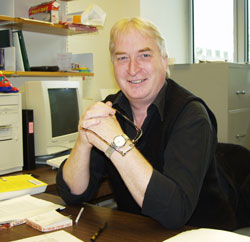
| News Releases | Special Bulletins | Daily News Archives | Feature Archives |
| The View from Trent | Trent Magazine | Focus Trent | Build 2000 |
Professor Rory Coughlan: Health care from a social psychologist’s perspective
 Psychology
professor Rory Coughlan, a new faculty member at Trent, lights up when
a discussion turns to seniors, midwifery or the health care system. These
are disparate topics, it might seem, on the surface, but they are very
connected in Prof. Coughlan’s research projects.
Psychology
professor Rory Coughlan, a new faculty member at Trent, lights up when
a discussion turns to seniors, midwifery or the health care system. These
are disparate topics, it might seem, on the surface, but they are very
connected in Prof. Coughlan’s research projects.
"Before I came to Trent, I was at the University of Victoria," says Prof. Coughlan. "I was teaching five classes and finishing my Ph.D., and I did a lot of work applying social psychology to health."
Prof. Coughlan explains that social psychology is a nexus for psychology, sociology, anthropology, history and other disciplines. This allows for unique, inter-disclipinary research, of which Prof. Coughlan is a perfect example.
"I was working with Neena Chappell, from the Centre on Aging; Peter Stephenson, a world-renowned medical anthropologist; and Jennifer Mullett from the Centre for Community Health Promotion. We wanted to look at the experiences of seniors with their physicians, and I became responsible for the qualitative research for the project," explains Prof. Coughlan.
Using interviews and focus groups, Prof. Coughlan quickly discovered the seniors he talked to were very unhappy with their medical experiences. They did not feel as if their doctors were listening to them. Doctors interviewed echoed this problem in the way they talked about their elderly patients and the need to make decisions for them.
"Our original question had been ‘what could be done to give patients more input into the health system and the care they receive.’ We quickly realized we had the wrong question because currently patients have no impact on the system at all," says Prof. Coughlan. "It confirmed that often doctors and patients live in completely different universes and it was a clue that something is radically wrong."
From this experience, Prof. Coughlan began to question whether patients from other age groups would concur with the seniors surveyed. However, younger age-based cohorts are difficult to establish because there tends to be less frequent doctor/patient interaction.
"I realized that one group we could study would be those people having babies, as there is a lot of medical contact during that experience," continues Prof. Coughlan. "Right at that time, the NDP government (in B.C.) had agreed to include midwifery in medicare, so I started to interview patients having babies with midwives, those with male physicians, those with female physicians and those with physicians paid by salary."
The results were astounding and, says Prof. Coughlan, completely lucid. One hundred per cent of the women who experienced pregnancy and birth with midwives were highly satisfied with their treatment. In addition, the women all felt the experience had changed how they would enter into any future medical relationship. They felt empowered and realized they should have a key role in making decisions about their own health.
Conversely, less than 15 per cent of the women with physician-assisted births were satisfied with their experience and the care they received. Of the few doctors noted who did have very satisfied patients, the model of care closely resembled that of midwives. They treated their patients respectfully, gave them lots of time with each appointment and allowed the patient room for input and decision-making.
"The pattern was overwhelming," says Prof. Coughlan, who is anxious to continue his research. He hopes to return to Victoria to interview the same group of midwives involved in the initial study, to see how their experience has or has not changed since they have been included in publicly-funded medicare. He also hopes to study a broader issue, such as type 2 diabetes, to see if patient experiences hold true to the other results he has discovered.
Back to Trent's Daily News
![]() Return to Trent Home
Return to Trent Home
Maintained by the Communications Office.
Last updated
December 6, 2002